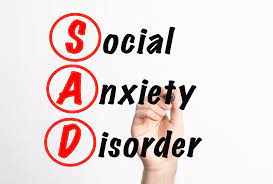Social Anxiety Disorder and the Efficacy of Cognitive Behavioral Therapy

Social Anxiety Disorder (SAD), or social phobia, is a debilitating mental health condition characterized by interactions and an overwhelming fear of social situations. Individuals with SAD regularly experience self-consciousness, intense anxiety, and avoidance behavior in social settings, severely impacting their quality of life. Among the various treatment modalities available, Cognitive Behavioral Therapy (CBT) has emerged as a highly effective approach to alleviating the symptoms of SAD. This essay will delve into the nuances of Social Anxiety Disorder, explore the underlying mechanisms, and provide an in-depth analysis of how Cognitive Behavioral Therapy serves as a transformative intervention in managing and recovering individuals with SAD.
Understanding Social Anxiety Disorder
Definition and Diagnostic Criteria
Social Anxiety Disorder is a psychiatric condition characterized by a persistent and excessive fear of social situations where scrutiny and evaluation by others are possible. This apprehension frequently leads to avoidance behavior, causing significant distress and impairment in daily functioning. According to the Diagnostic and Statistical Manual of Mental Disorders (DSM-5), SAD is diagnosed when these symptoms persist for at least six months and significantly interfere with the individual’s life.
Prevalence and Impact
SAD is a prevalent mental health issue worldwide, affecting millions of individuals across different age groups and cultural backgrounds. The disorder can manifest in various forms, from specific social phobias (e.g., public speaking, performing, or eating in public) to a more generalized fear of most social situations. Left untreated, SAD can have severe repercussions on an individual’s academic, occupational, and interpersonal aspects, leading to isolation and decreased overall life satisfaction.
Cognitive Behavioral Therapy: An Overview
Principles of Cognitive Behavioral Therapy
Cognitive Behavioral Therapy is a widely recognized and empirically supported psychotherapeutic approach that addresses maladaptive thought patterns and behaviors. It operates on the premise that our thoughts, emotions, and behaviors are interconnected, and altering negative thought patterns can lead to positive behavioral changes. CBT is a structured, goal-oriented therapy that emphasizes collaboration between the therapist and client, utilizing various techniques to challenge and reframe distorted thinking.
Application of CBT in Mental Health Treatment
CBT has been successfully applied to various mental health disorders, including depression, anxiety, post-traumatic stress, and eating disorders. The structured nature of CBT allows for the customization of interventions based on the specific needs and symptoms of the individual. CBT aims to empower individuals with the skills and strategies necessary to manage their symptoms and improve their overall well-being.
The Efficacy of Cognitive Behavioral Therapy in Treating Social Anxiety Disorder
Cognitive Restructuring
One of the foundational components of CBT for SAD is cognitive restructuring. This technique involves identifying and challenging irrational and negative thought patterns contributing to social anxiety. By replacing these distorted thoughts with more rational and balanced perspectives, individuals can gradually reduce anxiety and improve their confidence in social situations.
Exposure Therapy
Exposure therapy is another integral aspect of CBT for SAD. It involves systematically exposing individuals to feared social situations in a controlled and gradual manner. Through repeated exposure and practice, individuals learn to tolerate and adapt to the anxiety-provoking stimuli, ultimately reducing the intensity of their fear responses.
Social Skills Training
Building and enhancing social skills is critical for individuals with SAD. CBT incorporates techniques to improve communication, assertiveness, and interpersonal skills. By acquiring effective social skills, individuals gain confidence in their ability to navigate social interactions, reducing anxiety and avoidance behavior.
Beyond CBT: Holistic Approaches to Treating Social Anxiety Disorder
Complementary Interventions
While CBT stands as a cornerstone in the treatment of SAD, a holistic approach may incorporate additional interventions. These can include mindfulness-based practices, relaxation techniques, physical exercise, and lifestyle modifications. These complementary strategies contribute to overall well-being and can enhance the effectiveness of CBT.
Long-term Maintenance and Relapse Prevention
Sustaining progress after completing a course of CBT is vital for long-term recovery from SAD. Continuation of self-practice, regular check-ins with a therapist, and the incorporation of relapse prevention strategies are essential components of maintaining the gains achieved through CBT.
Conclusion
Social Anxiety Disorder is a pervasive mental health condition that profoundly affects individuals’ lives. Cognitive Behavioral Therapy stands as a beacon of hope for those grappling with the burdens of SAD, offering evidence-based techniques to challenge distorted thinking patterns, confront fears, and build essential social skills. By comprehensively addressing the cognitive and behavioral aspects of SAD, CBT empowers individuals to regain control over their lives, fostering a path towards increased confidence, resilience, and overall well-being. When combined with complementary interventions and long-term maintenance strategies, CBT becomes a powerful tool in the journey towards lasting recovery from Social Anxiety Disorder.
Reference:
Curtiss, J.E., Levine, D.S., Ander, I. and Baker, A.W. (2021). Cognitive-behavioral treatments for anxiety and stress-related disorders. Focus, [online] 19(2), pp.184–189. doi:https://doi.org/10.1176/appi.focus.20200045.
Raypole, C. (2021). Cognitive Behavioral Therapy (CBT) for Social Anxiety: How It Works. [online] Healthline. Available at: https://www.healthline.com/health/anxiety/social-anxiety-disorder-cognitive-behavioral-therapy.
Samantaray, N., Behera, N., Kar, N., Nayak, M. and Chaudhury, S. (2020). Effectiveness of cognitive behavioral therapy on social anxiety disorder: A comparative study. Industrial Psychiatry Journal, 29(1), p.76. doi:https://doi.org/10.4103/ipj.ipj_2_20.





